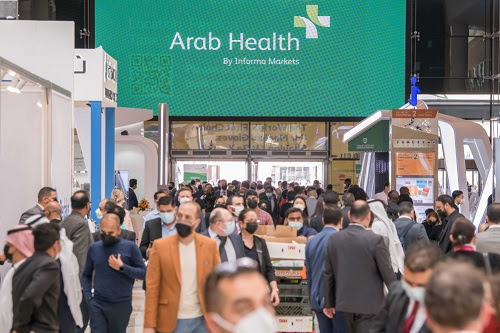With the COVID-19 pandemic acting as a transformation catalyst and accelerating innovation across the entire healthcare ecosystem, visitors at Arab Health 2022, which runs from 24 until 27 January at the Dubai World Trade Centre, had the opportunity to hear the latest insights, discoveries, and predictions for the future from the visionary companies that are transforming woman’s health across the globe.
According to the latest research from Frost & Sullivan, which was revealed at Arab Health, the COVID-19 pandemic is deepening pre-existing gender gaps, exposing vulnerabilities in our societies and heightening critical funding gaps. For example, in 2020, women lost 64 million jobs translating to $800 billion in earnings, and it is estimated there could be 7 million unintended pregnancies leading to maternal mortalities. In addition, many other unresolved challenges remain, including unattended mental health, lack of care for senior women, mental health for children, and workplace challenges, for example.
According to Reenita Das, Senior VP and Partner, Frost & Sullivan, who addressed the audience at the Healthcare Transformation Talks, “With the world’s female population expected to reach 4.2 billion in 2030, there is still a shortage of investment in Femtech with women’s health only receiving 5.8% (or $1.7 billion) of the $29 billion invested in digital health in 2021. Several barriers remain to realise the full potential in supporting Femtech, including a lack of women as VCs and accelerators and Femtech apps being created by men.”
Frost & Sullivan predicts that menopause and senior care will have a growth rate of over 19% by 2030 in the global Femtech solutions market, while fertility solutions will continue to hold the lion’s share of revenue ($936.1 million) at a steady 13.2%.
“The future is in gender-specific health and wellness, for both women and men. We need to stop looking at healthcare as a product, and our definition of healthcare needs to change. Health is more than an absence of disease, it is about building the prevention and prediction part of the system, which will be integral to the long-term success of our communities, and enlisting businesses, medical providers, governments and non-profits to work together,” said Das.
Other notable sessions at the Healthcare Transformation Talks include a discussion on “How AI is reshaping healthcare”, by Dr Tamara Sunbul, Medical Director of Clinical Informatics, John Hopkins Aramco Healthcare, Dhahran, Saudi Arabia; “Leading medicine through digital health”, by Bradlee Kellogg, Director Consulting Services, Houston Methodist Global HealthCare Services, Dubai, UAE; and “Making Sense of Health Data”, by Jamie Ireland, UAE Healthcare Lead, Amazon.
On the agenda tomorrow, attendees will hear insights on the value of health information exchanges, what’s next for digital health, digital health in pharmacy excellence, and the transformation journey of orthopaedic care.
Solenne Singer, Group Director for Informa Markets, said, “With the pandemic highlighting the importance of interoperability in healthcare, and the necessity for healthcare service providers to lay the right digital foundations to deliver improvements in access to patient care, Arab Health is delighted to convene the industries visionaries and tech pioneers to showcase how digital health technologies are evolving at an unprecedented pace.”
Arab Health, co-located with Medlab Middle East 2022, is the largest healthcare exhibition and congress in the MENA region. The event, which runs live and in-person until Thursday, 27 January, attracts global healthcare professionals and features a range of scientific lectures, industry briefings, product demonstrations and networking opportunities.
For more information, please visit www.arabhealthonline.com.

